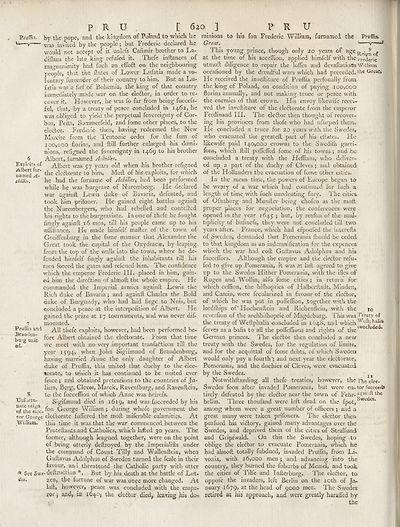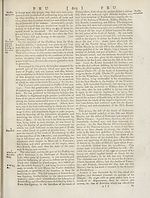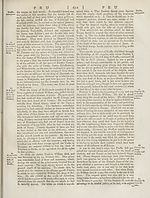Encyclopaedia Britannica > Volume 15, PLA-RAM
(688) Page 620
Download files
Complete book:
Individual page:
Thumbnail gallery: Grid view | List view

P R U . [620
Prufiii. the pope, and the kingdom of Poland to winch he
was invited by the people ; but Frederic declared he
would not accent of it unlefs Cafimir brother to La-
P R U
to his fon Frederic Willram, furnamed the Pruflia.
Exploits of
Albert fur-
named A-
(lilies.
would not accept
diflaus the late king refufed it. Thefe inftances _ of
magnanimity had fuch an efTeft on the neighbouring
people, that the ftates of Lower Lufatia made a vo¬
luntary furrender of their country to him. But as Lu-
latia was a fief of Bohemia, the king of that country
immediately made war on the elector, in order to re¬
cover it. However, he was fo far from being fuccefs-
ful, that, by a treaty of peace concluded in 1462, he
was obliged to yield the perpetual fovereignty of Cor-
bus, Peits, Sommerfeld, and fome other places, to the
elector. Frederic then, having redeemed the New
Marche from the Teutonic order for the fum of
100,000 florins, and ftill further enlarged his domi¬
nions, refigned the fovereignty in 1469 to his brother
Albert, lurnamed Achilles.
Albert was 57 years old when his brother refigned
the electorate to him. Mofl of his exploits, for which
he had the furname of Achilles, had been performed
while he was burgrave of Nuremberg. Fie declared
war againft Lewis duke of Bavaria, defeated, and
took him prifoner. He gained eight battles againfl
the Nurembergers, who had rebelled and contellcd
his rights to the burgraviate. In one of thefe he fought
fingly againll 16 men, till hss people came up to his
afuflance. He made himfelf mafter of the town of
Grexffenburg in the fame manner that Alexander the
Great took the capital of the Oxydracae, by leaping
from the top of the walls into the town, where he de¬
fended himfelf fingly againft the inhabitants till his
men forced the gates and referred him. The confidence
which the emperor Frederic III. placed in him, gain¬
ed him the direction of almoft the whole empire. He
commanded the Imperial armies againft Lewis the
Rich duke of Bavaria; and againft Charles the Bold
duke of Burgundy, who had laid fiege to Nnis, but
concluded a peace at the interpofition of Albert. He
gained the prize at I 7 tournaments, and was never dif-
mounted.
All thefe exploits, however, had been performed be¬
fore Albert obtained the electorate. From that time
rVe meet with no very important tranfaCtions till the
year 1594, when John Sigifmund of Brandenburg,
having married Anne the only daughter of Albert
duke of Pruflia, this united that duchy to the elec¬
torate, to which it has continued to be united ever
fince ; and obtained preteniions to the countries of Ju-
liers, Berg, Cleves, Marck, Ravenfburg, and Ravenllein,
to the fucceffion of which Anne was heirefs.
Sigifmund died in 1619, and was fucceeded by his
-rS- ^on George William ; during whole government the
tor George electorate fullered the rnoft mifcrable calamities. At
■William, this time it was that the war commenced between the
Proteftants and Catholics, which lafced 30 years. The
former, although leagued together, were on the point
of being utterly deftroyed by the Imperialifts under
the command of Count Tilly and Wallenftein, when
Guftavus Adolphus of Sweden turned the fcale in their
favour, and threatened the Catholic party with utter
* See Scce- dtftruction *. But by his death at the battle of Lut-
zen, the fortune of war was once more changed. At
lift, however, peace was concluded with the empe¬
ror j and> in 1640, the eleCtor died, leaving his do-
Prufiii and
IBraoden-
burg ui.it
3<1.
%
Uufortu-
minrons
Great.
This young prince, though only 20 years of age Re; ^ ^
at the time of his acceffion, applied himfelf with the t-Yederic
utmoft diligence to repair the Ioffes and devaluations William
occafioned by the dreadful wars which had preceded. tbe Great*
He received the inveftiture of Pruffia perfonally from
the king of Poland, on condition of paying 100,000
florins annually, and not making truce or peace with
the enemies of that crown. His envoy likewife recei¬
ved the inveftiture of the deflorate from the emperor
Ferdinand III. The eleflor then thought of recover¬
ing his provinces from thofe who had ufurped than*
lie concluded a truce tor 20 years with the Swedes,
who evacuated the greateft part of his eftates. He
likewife paid 140,000 crowns to the Swediih garri-
fons, which ftill poflefled fome of his towns; and he
concluded a treaty with the Heflians, who deliver¬
ed up a part of the duchy of Cleves ; and obtained
of the Hollanders the evacuation of fome other cities.
In the mean time, the powers of Europe began to
be weary of a war which had continued for Inch a
length of time with fuch unrelenting fury, lire cities-
of Ofhaburg and Munfler being chofen as the molt
proper places for negociation, the conferences were
opened in the year 1645 ; but, by reafon of the mul¬
tiplicity of bufinefs, they were not concluded till two
years after. France, which had efpoufed the interefls
of Sweden, demanded that Pomerania fhould be ceded
to that kingdom as an indemnification for the expences
which the war had coft Gultavus Adolphus and his
fucceflbrs. Although the empire and the elector refu¬
fed to give up Pomerania, it was at laft agreed to give
up to the Swedes Hither Pomerania, with the ifles of
Rugen and Wollin, alfo fome cities ; in return for
which ceflion, the bifhoprics of Halberlladt, Mindcn,
and Camin, were fecularized in favour of the elector,
of which he was put in pofl'efllon, together with the
lordfhips of’ Hochenftcin and Richenitein, with the
reverfion of the archbifhopric of Magdeburg. This was Treaty of
the treaty of Weftpbalia concluded in 1648, s^id which
ferves as a bafis to all the pofleflions and rights of the '’Wnc u
German princes. The elector then concluded a new
treaty with the Swedes, for the regulation of limits,
and for the acquittal of fome debts, of which Sweden
would only pay a fourth ; and next year the electorate,
Pomerania, and the duchies of Cleves, were evacuated
by the Swedes. it
Notwithftanding all thefe treaties, however, the rhe elec-
Swedes foon after invaded Pomerania, but were en-tor fuccecda
tirely defeated by the elector near the town of Fehr-
bellin. Three thoufand were left dead on the fpot,Swedcs*
among whom were a great number of officers ; and a
great many were taken prifoners. The elector then
purfued his victory, gained many advantages over the
Swedes, and deprived them of tire cities of Stralfund
and Gripiwald. On this the Swedes, hoping to
oblige the eleftor to evacuate Pomerania, which he
had almoft totally fubdued, invaded Pruffia, from Li¬
vonia, with 16,000 men j and advancing into the
country, they burned the fuburbs of Memel, and took
the cities of Tilfe and Inilerburg. The elector, to
oppoie the invaders, left Berlin on the 10th of Ja¬
nuary 1679, at the head of 9000 men. The Swedes
retired at his approach, and were greatly haraffed by
the
10
Prufiii. the pope, and the kingdom of Poland to winch he
was invited by the people ; but Frederic declared he
would not accent of it unlefs Cafimir brother to La-
P R U
to his fon Frederic Willram, furnamed the Pruflia.
Exploits of
Albert fur-
named A-
(lilies.
would not accept
diflaus the late king refufed it. Thefe inftances _ of
magnanimity had fuch an efTeft on the neighbouring
people, that the ftates of Lower Lufatia made a vo¬
luntary furrender of their country to him. But as Lu-
latia was a fief of Bohemia, the king of that country
immediately made war on the elector, in order to re¬
cover it. However, he was fo far from being fuccefs-
ful, that, by a treaty of peace concluded in 1462, he
was obliged to yield the perpetual fovereignty of Cor-
bus, Peits, Sommerfeld, and fome other places, to the
elector. Frederic then, having redeemed the New
Marche from the Teutonic order for the fum of
100,000 florins, and ftill further enlarged his domi¬
nions, refigned the fovereignty in 1469 to his brother
Albert, lurnamed Achilles.
Albert was 57 years old when his brother refigned
the electorate to him. Mofl of his exploits, for which
he had the furname of Achilles, had been performed
while he was burgrave of Nuremberg. Fie declared
war againft Lewis duke of Bavaria, defeated, and
took him prifoner. He gained eight battles againfl
the Nurembergers, who had rebelled and contellcd
his rights to the burgraviate. In one of thefe he fought
fingly againll 16 men, till hss people came up to his
afuflance. He made himfelf mafter of the town of
Grexffenburg in the fame manner that Alexander the
Great took the capital of the Oxydracae, by leaping
from the top of the walls into the town, where he de¬
fended himfelf fingly againft the inhabitants till his
men forced the gates and referred him. The confidence
which the emperor Frederic III. placed in him, gain¬
ed him the direction of almoft the whole empire. He
commanded the Imperial armies againft Lewis the
Rich duke of Bavaria; and againft Charles the Bold
duke of Burgundy, who had laid fiege to Nnis, but
concluded a peace at the interpofition of Albert. He
gained the prize at I 7 tournaments, and was never dif-
mounted.
All thefe exploits, however, had been performed be¬
fore Albert obtained the electorate. From that time
rVe meet with no very important tranfaCtions till the
year 1594, when John Sigifmund of Brandenburg,
having married Anne the only daughter of Albert
duke of Pruflia, this united that duchy to the elec¬
torate, to which it has continued to be united ever
fince ; and obtained preteniions to the countries of Ju-
liers, Berg, Cleves, Marck, Ravenfburg, and Ravenllein,
to the fucceffion of which Anne was heirefs.
Sigifmund died in 1619, and was fucceeded by his
-rS- ^on George William ; during whole government the
tor George electorate fullered the rnoft mifcrable calamities. At
■William, this time it was that the war commenced between the
Proteftants and Catholics, which lafced 30 years. The
former, although leagued together, were on the point
of being utterly deftroyed by the Imperialifts under
the command of Count Tilly and Wallenftein, when
Guftavus Adolphus of Sweden turned the fcale in their
favour, and threatened the Catholic party with utter
* See Scce- dtftruction *. But by his death at the battle of Lut-
zen, the fortune of war was once more changed. At
lift, however, peace was concluded with the empe¬
ror j and> in 1640, the eleCtor died, leaving his do-
Prufiii and
IBraoden-
burg ui.it
3<1.
%
Uufortu-
minrons
Great.
This young prince, though only 20 years of age Re; ^ ^
at the time of his acceffion, applied himfelf with the t-Yederic
utmoft diligence to repair the Ioffes and devaluations William
occafioned by the dreadful wars which had preceded. tbe Great*
He received the inveftiture of Pruffia perfonally from
the king of Poland, on condition of paying 100,000
florins annually, and not making truce or peace with
the enemies of that crown. His envoy likewife recei¬
ved the inveftiture of the deflorate from the emperor
Ferdinand III. The eleflor then thought of recover¬
ing his provinces from thofe who had ufurped than*
lie concluded a truce tor 20 years with the Swedes,
who evacuated the greateft part of his eftates. He
likewife paid 140,000 crowns to the Swediih garri-
fons, which ftill poflefled fome of his towns; and he
concluded a treaty with the Heflians, who deliver¬
ed up a part of the duchy of Cleves ; and obtained
of the Hollanders the evacuation of fome other cities.
In the mean time, the powers of Europe began to
be weary of a war which had continued for Inch a
length of time with fuch unrelenting fury, lire cities-
of Ofhaburg and Munfler being chofen as the molt
proper places for negociation, the conferences were
opened in the year 1645 ; but, by reafon of the mul¬
tiplicity of bufinefs, they were not concluded till two
years after. France, which had efpoufed the interefls
of Sweden, demanded that Pomerania fhould be ceded
to that kingdom as an indemnification for the expences
which the war had coft Gultavus Adolphus and his
fucceflbrs. Although the empire and the elector refu¬
fed to give up Pomerania, it was at laft agreed to give
up to the Swedes Hither Pomerania, with the ifles of
Rugen and Wollin, alfo fome cities ; in return for
which ceflion, the bifhoprics of Halberlladt, Mindcn,
and Camin, were fecularized in favour of the elector,
of which he was put in pofl'efllon, together with the
lordfhips of’ Hochenftcin and Richenitein, with the
reverfion of the archbifhopric of Magdeburg. This was Treaty of
the treaty of Weftpbalia concluded in 1648, s^id which
ferves as a bafis to all the pofleflions and rights of the '’Wnc u
German princes. The elector then concluded a new
treaty with the Swedes, for the regulation of limits,
and for the acquittal of fome debts, of which Sweden
would only pay a fourth ; and next year the electorate,
Pomerania, and the duchies of Cleves, were evacuated
by the Swedes. it
Notwithftanding all thefe treaties, however, the rhe elec-
Swedes foon after invaded Pomerania, but were en-tor fuccecda
tirely defeated by the elector near the town of Fehr-
bellin. Three thoufand were left dead on the fpot,Swedcs*
among whom were a great number of officers ; and a
great many were taken prifoners. The elector then
purfued his victory, gained many advantages over the
Swedes, and deprived them of tire cities of Stralfund
and Gripiwald. On this the Swedes, hoping to
oblige the eleftor to evacuate Pomerania, which he
had almoft totally fubdued, invaded Pruffia, from Li¬
vonia, with 16,000 men j and advancing into the
country, they burned the fuburbs of Memel, and took
the cities of Tilfe and Inilerburg. The elector, to
oppoie the invaders, left Berlin on the 10th of Ja¬
nuary 1679, at the head of 9000 men. The Swedes
retired at his approach, and were greatly haraffed by
the
10
Set display mode to:
![]() Universal Viewer |
Universal Viewer | ![]() Mirador |
Large image | Transcription
Mirador |
Large image | Transcription
Images and transcriptions on this page, including medium image downloads, may be used under the Creative Commons Attribution 4.0 International Licence unless otherwise stated. ![]()
| Encyclopaedia Britannica > Encyclopaedia Britannica > Volume 15, PLA-RAM > (688) Page 620 |
|---|
| Permanent URL | https://digital.nls.uk/191909720 |
|---|
| Attribution and copyright: |
|
|---|
| Description | Ten editions of 'Encyclopaedia Britannica', issued from 1768-1903, in 231 volumes. Originally issued in 100 weekly parts (3 volumes) between 1768 and 1771 by publishers: Colin Macfarquhar and Andrew Bell (Edinburgh); editor: William Smellie: engraver: Andrew Bell. Expanded editions in the 19th century featured more volumes and contributions from leading experts in their fields. Managed and published in Edinburgh up to the 9th edition (25 volumes, from 1875-1889); the 10th edition (1902-1903) re-issued the 9th edition, with 11 supplementary volumes. |
|---|---|
| Additional NLS resources: |
|

